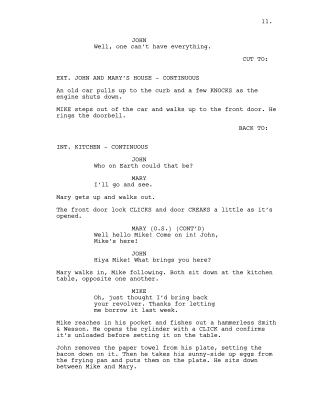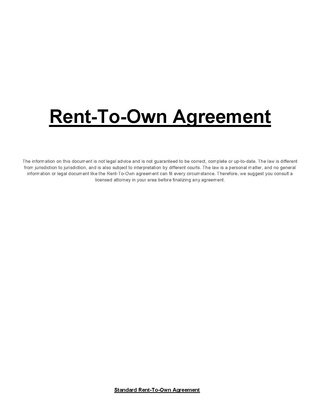Related Research Articles

A screenwriter is a writer who practices the craft of screenwriting, writing screenplays on which mass media, such as films, television programs, and video games, are based.
In finance, the style or family of an option is the class into which the option falls, usually defined by the dates on which the option may be exercised. The vast majority of options are either European or American (style) options. These options—as well as others where the payoff is calculated similarly—are referred to as "vanilla options". Options where the payoff is calculated differently are categorized as "exotic options". Exotic options can pose challenging problems in valuation and hedging.

Renting, also known as hiring or letting, is an agreement where a payment is made for the use of a good, service or property owned by another over a fixed period of time. To maintain such an agreement, a rental agreement is signed to establish the roles and expectations of both the tenant and landlord. There are many different types of leases. The type and terms of a lease are decided by the landlord and agreed upon by the renting tenant.
Right of first refusal is a contractual right that gives its holder the option to enter a business transaction with the owner of something, according to specified terms, before the owner is entitled to enter into that transaction with a third party. A first refusal right must have at least three parties: the owner, the third party or buyer, and the option holder. In general, the owner must make the same offer to the option holder before making the offer to the buyer. The right of first refusal is similar in concept to a call option.
Build–operate–transfer (BOT) or build–own–operate–transfer (BOOT) is a form of project delivery method, usually for large-scale infrastructure projects, wherein a private entity receives a concession from the public sector to finance, design, construct, own, and operate a facility stated in the concession contract. The private entity will have the right to operate it for a set period of time. This enables the project proponent to recover its investment and operating and maintenance expenses in the project.
Filmmaking or film production is the process by which a motion picture is produced. Filmmaking involves a number of complex and discrete stages, beginning with an initial story, idea, or commission. Production then continues through screenwriting, casting, pre-production, shooting, sound recording, post-production, and screening the finished product before an audience, which may result in a film release and exhibition. The process is nonlinear, as the director typically shoots the script out of sequence, repeats shots as needed, and puts them together through editing later. Filmmaking occurs in a variety of economic, social, and political contexts around the world, and uses a variety of technologies and cinematic techniques to make theatrical films, episodic films for television and streaming platforms, music videos, and promotional and educational films.

A Lease-Purchase Contract, also known as a lease purchase agreement or rent-to-own agreement, allows consumers to obtain durable goods or rent-to-own real estate without entering into a standard credit contract. It is a shortened name for a lease with option to purchase contract. For real estate, a lease purchase contract combines elements of a traditional rental agreement with an exclusive right of first refusal option for later purchase of the home.
Project finance is the long-term financing of infrastructure and industrial projects based upon the projected cash flows of the project rather than the balance sheets of its sponsors. Usually, a project financing structure involves a number of equity investors, known as 'sponsors', and a 'syndicate' of banks or other lending institutions that provide loans to the operation. They are most commonly non-recourse loans, which are secured by the project assets and paid entirely from project cash flow, rather than from the general assets or creditworthiness of the project sponsors, a decision in part supported by financial modeling; see Project finance model. The financing is typically secured by all of the project assets, including the revenue-producing contracts. Project lenders are given a lien on all of these assets and are able to assume control of a project if the project company has difficulties complying with the loan terms.
Film rights are rights under copyright law to produce a film as a derivative work of a given item of intellectual property. In US law, these rights belong to the holder of the copyright, who may sell them to someone in the film industry—usually a producer or director, or sometimes a specialist broker of such properties—who will then try to gather industry professionals and secure the financial backing necessary to convert the property into a film. Such rights differ from the right to commercially exhibit a finished motion picture, which rights are usually referred to as "exhibition rights" or "public-performance rights".
A lease option is a type of contract used in both residential and commercial real estate. In a lease-option, a property owner and tenant agree that, at the end of a specified rental period for a given property, the renter has the option of purchasing the property.
Film budgeting refers to the process by which a line producer, unit production manager, or production accountant prepares a budget for a film production. This document, which could be over 130 pages long, is used to secure financing for and lead to pre-production and production of the film. Multiple drafts of the budget may be required to whittle down costs. A budget is typically divided into four sections: above the line, below the line, post-production, and other. The budget excludes film promotion and marketing, which is the responsibility of the film distributor. Film financing can be acquired from a private investor, sponsor, product placement, film studio, entertainment company, and/or out-of-pocket funds.
Film finance is an aspect of film production that occurs during the development stage prior to pre-production, and is concerned with determining the potential value of a proposed film.

Legendary Entertainment, LLC is an American mass media and film production company based in Burbank, California, founded by Thomas Tull. The company has often collaborated with the major studios, including Warner Bros. Pictures, Universal Pictures, Sony Pictures and Paramount Pictures, as well as streaming services such as Netflix and Hulu. Since 2016, Legendary has been a subsidiary of the Chinese conglomerate Wanda Group and American equity firm Apollo.
In finance, an option is a contract which conveys to its owner, the holder, the right, but not the obligation, to buy or sell a specific quantity of an underlying asset or instrument at a specified strike price on or before a specified date, depending on the style of the option. Options are typically acquired by purchase, as a form of compensation, or as part of a complex financial transaction. Thus, they are also a form of asset and have a valuation that may depend on a complex relationship between underlying asset price, time until expiration, market volatility, the risk-free rate of interest, and the strike price of the option. Options may be traded between private parties in over-the-counter (OTC) transactions, or they may be exchange-traded in live, public markets in the form of standardized contracts.
A first-look deal is any contract containing a clause granting, usually for a fee or other consideration that covers a specified period of time, a pre-emption right, right of first refusal, or right of first offer to another party, who then is given the first opportunity to buy outright, co-own, invest in, license, etc., something that is newly coming into existence or on the market for the first time or after an absence, such as intellectual property or real property.
An executory contract is a contract that has not yet been fully performed or fully executed. It is a contract in which both sides still have important performance remaining. However, an obligation to pay money, even if such obligation is material, does not usually make a contract executory. An obligation is material if a breach of contract would result from the failure to satisfy the obligation. A contract that has been fully performed by one party but not by the other party is not an executory contract. See, generally, Countryman, Vern, "Executory Contracts in Bankruptcy: Part I" (1973). Minnesota Law Review. 2459. https://scholarship.law.umn.edu/mlr/2459 and "Executory Contracts in Bankruptcy: Part II" (1974). Minnesota Law Review. 2460.https://scholarship.law.umn.edu/mlr/2460.

Tag along rights (TARs) comprise a group of clauses in a contract which together have the effect of allowing the minority shareholder(s) in a corporation to also take part in a sale of shares by the majority shareholder to a third party under the same terms and conditions.
Islamic finance products, services and contracts are financial products and services and related contracts that conform with Sharia. Islamic banking and finance has its own products and services that differ from conventional banking. These include Mudharabah, Wadiah (safekeeping), Musharakah, Murabahah, Ijar (leasing), Hawala, Takaful, and Sukuk.

Ijarah,, is a term of fiqh and product in Islamic banking and finance. In traditional fiqh, it means a contract for the hiring of persons or renting/leasing of the services or the “usufruct” of a property, generally for a fixed period and price. In hiring, the employer is called musta’jir, while the employee is called ajir. Ijarah need not lead to purchase. In conventional leasing an "operating lease" does not end in a change of ownership, nor does the type of ijarah known as al-ijarah (tashghiliyah).

Sharia and securities trading is the impact of conventional financial markets activity for those following the islamic religion and particularly sharia law. Sharia practices ban riba and involvement in haram. It also forbids gambling (maisir) and excessive risk. This, however has not stopped some in Islamic finance industry from using some of these instruments and activities, but their permissibility is a subject of "heated debate" within the religion.
References
- 1 2 3 Kirkpatrick, Scott (18 December 2021). "The Screenwriters Guide To An Option Agreement". Filmmaking Stuff. Retrieved 25 January 2023.
- 1 2 Pascual, Ashley. "How To Option Film Rights To A Book". Beverly Boy Productions. Retrieved 25 January 2023.
- 1 2 "Film option agreement". Thomson Reuters Practical Law - Thomson Reuters Practical Law - Media and Telecoms. Thomson Reuters. Retrieved 25 January 2023.
- ↑ Don Chance, Eric Hillebrand and Jimmy Hilliard (2009). Pricing options on film revenue, Risk 22, 80-86.
- ↑ S. Young, J. Gong, and W. Van der Stede (2012). Using real options to make decisions in the motion picture industry. Strategic finance . pp. 53-59.
- ↑ J. Gong, J. Jianxin, S. Young, and W. Van der Stede (2011). Real Options in the Motion Picture Industry: Evidence from Film Marketing and Sequels. Contemporary Accounting Research, Vol. 28, No. 5, pp. 1438-1466, Winter 2011.
- 1 2 3 4 Schmidt, Silvie (23 May 2020). "Option agreements for film and TV – what should producers look out for?". Raindance.org. Retrieved 25 January 2023.
- ↑ Reservoir Dogs : Lawrence Bender's Commentary on DVD Special Edition